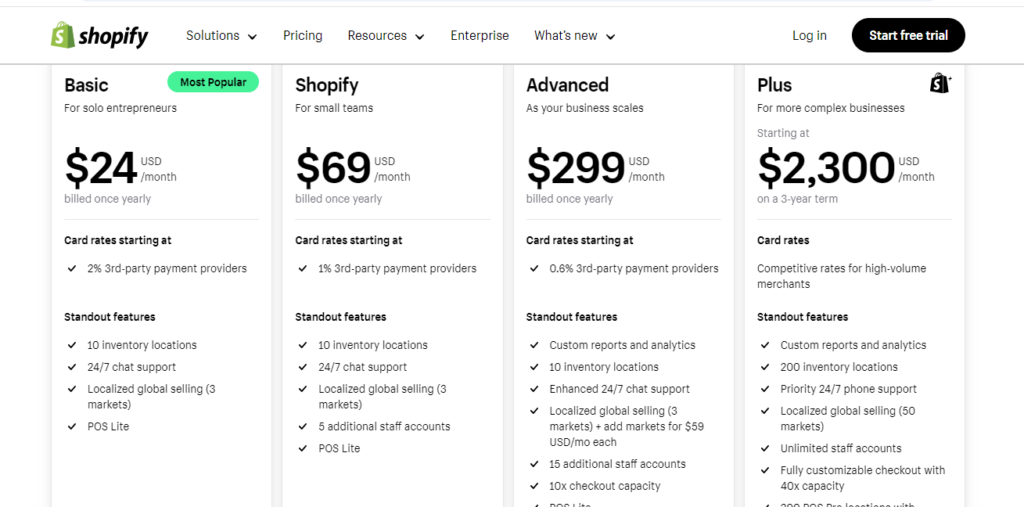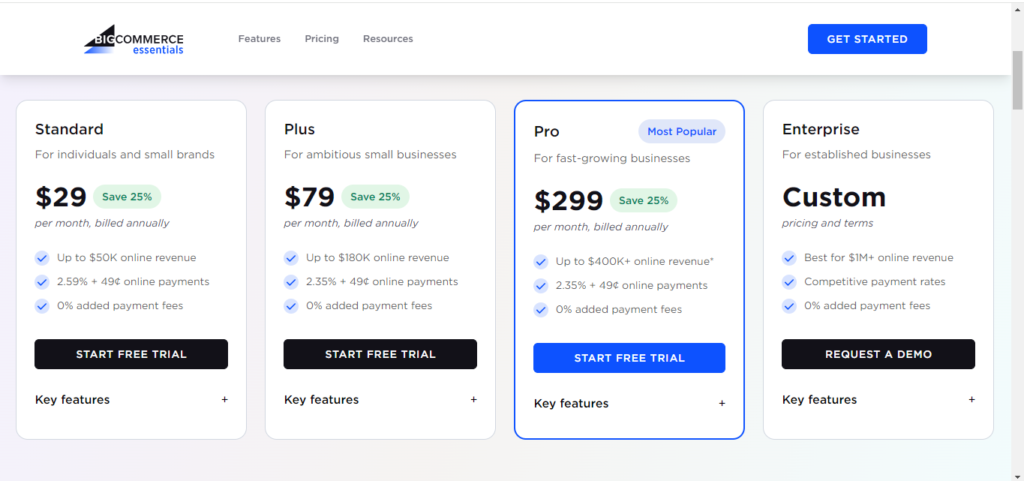Introduction
Choosing the right e-commerce platform is vital for any business aiming to thrive in the online marketplace. With a plethora of options available, making an informed decision can feel daunting. This blog post will compare three of the leading e-commerce platforms—Shopify, WooCommerce, and BigCommerce—across essential categories such as pricing, ease of use, customization, features, SEO tools, and customer support. Whether you’re a startup or an established business looking to expand, this guide will provide the insights you need to select the best platform for your online success.
Pricing and Plans
When choosing an e-commerce platform, understanding the pricing structure is crucial. Shopify, WooCommerce, and BigCommerce offer different pricing models, each with its advantages depending on the scale and specific needs of your business. Below is a comparison of the pricing and plans for these three platforms.
| Platform | Basic Plan | Mid-Tier Plan | Advanced Plan | Transaction Fees |
|---|---|---|---|---|
| Shopify | $39/month | $105/month | $399/month | 2.9% + 30¢ per transaction (lower fees with higher plans) |
| WooCommerce | Free (Plugin Cost) | Varies by hosting | Varies by hosting | No transaction fees, but payment gateway fees apply |
| BigCommerce | $39/month | $105/month | $399/month | No transaction fees |
Shopify Pricing
Shopify offers three main pricing plans: Basic Shopify ($39/month), Shopify ($105/month), and Advanced Shopify ($399/month). Each plan includes hosting and basic e-commerce features. However, transaction fees apply, unless Shopify Payments is used. This platform is a solid choice for businesses that prefer an all-in-one package with hosting included.

WooCommerce Pricing
WooCommerce operates differently as a free WordPress plugin. The cost primarily comes from hosting, which can range from $10 to $30 per month, depending on the provider. While WooCommerce is free to use, additional costs come from extensions and payment gateways. This pricing flexibility is ideal for businesses looking for a highly customizable, cost-efficient solution.
BigCommerce Pricing
BigCommerce also provides three pricing tiers: Standard ($39/month), Plus ($105/month), and Pro ($399/month). Unlike Shopify, BigCommerce doesn’t charge transaction fees, making it more appealing for high-volume sellers. However, similar to Shopify, all plans include hosting and necessary features for online stores.

Ease of Use
When choosing the best e-commerce platform, ease of use is crucial, especially for beginners or those without technical expertise. Each of the platforms—Shopify, WooCommerce, and BigCommerce—offers a unique experience in terms of setup and day-to-day management.
Shopify
Shopify is widely known for its user-friendly interface. From setting up a store to managing products, the platform simplifies the entire process. Shopify offers a drag-and-drop editor, making it easy for users to customize their site without any coding skills. The platform is designed to guide users through the setup, making it a great choice for those looking for a quick and hassle-free way to launch their e-commerce store.
WooCommerce
WooCommerce is a plugin for WordPress, which means its ease of use depends on the user’s familiarity with WordPress. While WooCommerce offers powerful customization options, it does require more setup and technical know-how compared to Shopify. However, for users already comfortable with WordPress, WooCommerce can be easy to manage and offers greater control over website features.
BigCommerce
BigCommerce also provides an intuitive interface, though it may require a slight learning curve for first-time users. Like Shopify, BigCommerce simplifies the store setup and management process with built-in features and customizable themes. However, some users may find that BigCommerce’s extensive options feel overwhelming at first, but once familiar, it offers a comprehensive toolset for e-commerce management.
Verdict
In terms of ease of use, Shopify is often considered the most accessible, making it an ideal e-commerce platform for those new to online selling. WooCommerce offers more flexibility for WordPress users, while BigCommerce strikes a balance between ease of use and advanced features.
By considering how easy each platform is to use, businesses can select the best e-commerce platform that meets their skill level and operational needs.
Customization and Flexibility
When choosing the best e-commerce platform, customization and flexibility are crucial for creating a unique online store that meets your business needs. Let’s compare Shopify, WooCommerce, and BigCommerce in terms of how much control they give you over design and functionality.
Shopify
Shopify offers a wide range of customizable templates, but it’s slightly more limited when it comes to deep customization. While you can modify the design using the theme editor, making more advanced changes requires knowledge of Shopify’s Liquid coding language. Shopify apps provide additional functionality, but most come at an extra cost. For businesses seeking a balance between ease of use and customization, Shopify is a solid option.
WooCommerce
WooCommerce shines when it comes to customization and flexibility. Since it’s built on WordPress, you have full control over every aspect of your store. You can choose from thousands of free and premium themes, and with access to the WordPress plugin library, there are endless ways to extend your store’s functionality. This makes WooCommerce an excellent choice for those with technical skills or businesses that want full control over their e-commerce platform.
BigCommerce
BigCommerce offers a middle ground. It provides robust customization options without requiring advanced coding skills. You can easily tweak themes and layouts with the platform’s visual editor, and for more complex changes, BigCommerce supports HTML, CSS, and JavaScript modifications. It also integrates well with third-party apps to add features and functionality, making it a flexible platform for growing businesses.
Conclusion
In terms of customization and flexibility, WooCommerce leads the way for businesses wanting full control, especially for users familiar with WordPress. Shopify is easier to use but may feel restrictive to those looking for deeper customization. BigCommerce provides a good balance, offering flexibility without a steep learning curve. Each platform offers a different level of customization depending on your business needs and technical expertise.
Customization and Flexibility
When choosing the best e-commerce platform, customization and flexibility are crucial for creating a unique online store that meets your business needs. Let’s compare Shopify, WooCommerce, and BigCommerce in terms of how much control they give you over design and functionality.
Shopify
Shopify offers a wide range of customizable templates, but it’s slightly more limited when it comes to deep customization. While you can modify the design using the theme editor, making more advanced changes requires knowledge of Shopify’s Liquid coding language. Shopify apps provide additional functionality, but most come at an extra cost. For businesses seeking a balance between ease of use and customization, Shopify is a solid option.
WooCommerce
WooCommerce shines when it comes to customization and flexibility. Since it’s built on WordPress, you have full control over every aspect of your store. You can choose from thousands of free and premium themes, and with access to the WordPress plugin library, there are endless ways to extend your store’s functionality. This makes WooCommerce an excellent choice for those with technical skills or businesses that want full control over their e-commerce platform.
BigCommerce
BigCommerce offers a middle ground. It provides robust customization options without requiring advanced coding skills. You can easily tweak themes and layouts with the platform’s visual editor, and for more complex changes, BigCommerce supports HTML, CSS, and JavaScript modifications. It also integrates well with third-party apps to add features and functionality, making it a flexible platform for growing businesses.
In terms of customization and flexibility, WooCommerce leads the way for businesses wanting full control, especially for users familiar with WordPress. Shopify is easier to use but may feel restrictive to those looking for deeper customization. BigCommerce provides a good balance, offering flexibility without a steep learning curve. Each platform offers a different level of customization depending on your business needs and technical expertise.
SEO and Marketing Tools
When choosing the best e-commerce platform, SEO and marketing tools play a crucial role in helping your online store rank higher on search engines and attract more customers.
Shopify offers a wide range of built-in SEO features, such as editable title tags, meta descriptions, and URLs. It also provides integration with Google Analytics and Facebook Ads, helping you track performance and run marketing campaigns. For more advanced users, Shopify has apps that offer additional SEO functionalities like product reviews and email marketing automation.
WooCommerce, being a WordPress plugin, benefits from WordPress’s strong SEO capabilities. You can use plugins like Yoast SEO to optimize product pages, posts, and categories for search engines. WooCommerce also allows for easy integration with email marketing services, and Google Analytics can be added through plugins to track customer behavior.
BigCommerce offers robust SEO features out of the box, including automatic sitemaps, customizable URLs, and rich snippets for product pages. Its marketing tools include built-in email marketing, promotions, and discount features, as well as integrations with Google Shopping and Facebook Ads.
Overall, when comparing these e-commerce platforms, Shopify and BigCommerce are great for those who want built-in SEO and marketing tools, while WooCommerce excels in flexibility with third-party plugins.
Customer Support and Resources
When choosing between Shopify, WooCommerce, and BigCommerce, customer support and resources are crucial aspects to consider. Running an online store comes with challenges, and having reliable support can make a big difference.
Shopify is known for its excellent customer support. It offers 24/7 support through live chat, email, and phone. Additionally, Shopify has a comprehensive Help Center, along with a vast library of guides and tutorials. Whether you’re a beginner or an advanced user, Shopify provides ample resources to help you navigate any issues you may face with your e-commerce platform.
WooCommerce, being an open-source plugin for WordPress, operates a little differently. It doesn’t provide direct customer support like Shopify or BigCommerce. However, WooCommerce has an active community forum, and you can get support through WordPress experts or by contacting developers who specialize in WooCommerce. It also has detailed documentation and knowledge bases to guide users.
BigCommerce also offers 24/7 customer support through live chat, phone, and email. It provides a variety of helpful resources, such as a comprehensive Help Center and video tutorials. Like Shopify, BigCommerce is known for its robust support, which can be a major advantage when using an e-commerce platform for scaling your business.
Overall, when comparing these e-commerce platforms, Shopify and BigCommerce stand out for their direct and reliable customer support, while WooCommerce relies more on its community and documentation for assistance.
Conclusion
In conclusion, selecting the right e-commerce platform—whether it’s Shopify, WooCommerce, or BigCommerce—depends on various factors unique to your business needs. Shopify is an excellent choice for those seeking a user-friendly interface with reliable customer support, making it ideal for beginners and those who want a hassle-free experience. WooCommerce offers flexibility and customization for those already using WordPress, appealing to users who have technical expertise and prefer a tailored approach. BigCommerce, with its robust support and comprehensive features, is well-suited for businesses looking to scale quickly without compromising on functionality.
Ultimately, the best e-commerce platform for you will align with your specific goals, budget, and technical proficiency. By carefully weighing these comparisons, you can make an informed decision that sets your online business up for success.

